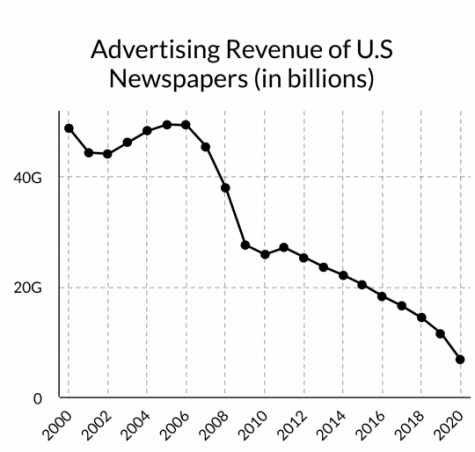In a 2004 Wired article, associate professor Adam L. Penenberg warned about the effect a new online Generation Z might have on the newspaper industry. He writes, “what this world will look like is anyone’s guess, but it probably won’t include The Washington Post thudding on anyone’s doorstep at 5 in the morning.”
Turns out, Penenberg was right. As found in a joint Common Sense Media poll, over half of teenagers get their news from social media or YouTube rather than traditional journalism, particularly local sources. But while people seem to be bombarded with more information than ever, a decline in local journalism is a threat not only to the sustainability of investigative reporting, but to the quality of it as well. For every local newspaper killed by the internet or investors, more politicians, billionaires and politicians again are able to avoid consequences. While the papers might not be piling up anymore, the problems certainly are.
While they might not realize it, most people read local reporting every day. In a 2018 study by Duke University, analysts found that while local papers account for only 25% of media outlets, they make up almost half of all original reporting. In particular, local papers excel at CIN: critical information need, or local investigative subjects that they are uniquely suited to report on.
Out of the fifteen 2020 Pulitzer Prize winning newspapers, ten of them were local. Coverage included a Baltimore mayor’s manipulation of the public hospital system, pre-trial deaths in a small Texas county, and a lack of policing in Alaskan villages. The Orlando Sentinel investigated school vouchers being given to anti-LGBTQ schools. Perhaps the most high-profile story of the past few years, the breaking of billionaire Jeffery Epstein’s child trafficking ring by the Miami Herald, was an unprecedented show of both the power and rare acknowledgement of local journalists.
“That’s how unappreciated journalists are,” comedian Hasan Minaj said on his show, Patriot Act. “[The reporter]’s been investigating a pedophile with a sex island, and the thing that shocks her is basic recognition.”
Local reporting has proven that it leads to change, yet the effect can be more clear when this kind of reporting doesn’t happen.
When former Florida governor (now senator) Rick Scott was first elected to office in 2011, recession-battered newspapers were already stretched thin. So when, as Nieman Reports details, Scott deliberately avoided the press and used cooperative local TV stations to spread misinformation, many papers deliberately self-censored and found it best to not write about the administration at all. The consequence? A governorship where Scott tripled his asset’s values, grew his family’s combined wealth to over half a billion dollars, and directly lied to the public about his conflicts of interest, the Congressional Integrity Project reports.
When local journalism goes down, government costs go up, as corrupt dealings and higher deficits go unchecked, researchers at the University of Notre Dame found in a study of local newspapers from 1996-2015. Without the watchdogs, both scrutiny and scruples disappear.
“Our analysis suggests that newspaper companies, or the information they provide, is a public good and it’s worth providing,” one of the researchers said. “But if we don’t finance it, no one will produce it.”
Because while local journalism is more crucial than ever, it’s also under more danger than ever. More than 25% of local newsrooms have closed since 2004, newsrooms were forced to cut 45% of their staff from 2008-2017, and over 65 million Americans now live in “news deserts”, communities where there are no daily local papers. COVID-19 has only made this worse; Time magazine reports that in one quarter of last year, ad revenue went down 42%, and over 60 local newsrooms closed over the course of 2020.

A large part this is what Penenberg warned about, with newspapers not being able to keep up to a changing digital business model. Pew Research Center reports that from 2008-2018, newspaper ad revenue dropped $37.8 billion to $14.3 billion, due to both less interest in in-print papers and online monopolies on ads with Google and Facebook. As the Washington Post writes, these two companies are responsible for over half of all online advertising revenue.
“These companies are more powerful than Standard Oil in its heyday,” lawyer Doug Reynolds said in an interview to the Wall Street Journal. Reynolds, who owns a West Virginian newspaper chain, is leading an antitrust lawsuit against the companies for monopolizing and conspiring on digital ads, a legal first for the industry.
“They’re keeping score on the same playing field [they made],” he said to The Verge. “It’s an untenable position.”
But often, papers aren’t just falling away- they’re being stripped for profit.
Private equity funds are investment funds that buy and restructure companies for profit. But by using tactics like transferred debt, “vulture funds” and huge budget cuts, many of these funds are squeezing newspapers out of business.
“[Equity funds] see newspaper’s failures as their opportunity,” Minaj said.
Data collected by Minaj’s show found that 30% of all newspapers in the US are owned by just two of these funds. The Orlando Sentinel is one such paper. However, these funds typically don’t care about the paper’s success. Budget cuts and forced bankruptcy lead to excellent profit margins, but with expected consequences. Equity-owned papers downsize more than 72% of jobs, including unionized ones, and equity-owned businesses are 10x more likely to go bankrupt.
There’s no single solution to these problems. Nonprofit investigation sites such as ProPublica and The Texas Tribune offer national coverage, but might lose some of the local aspect. And collective funds such as the Orlando Sentinel’s “News Fund” might bring in crucial support, but to many it seems more like a stopgap than a solution.
Journalism cannot be easily replaced. Its current competitor information-wise, social media, is the difference between researched reporting and eye candy. But keeping local newsrooms alive is more important than ever- we can’t windowshop for our democracy.





















